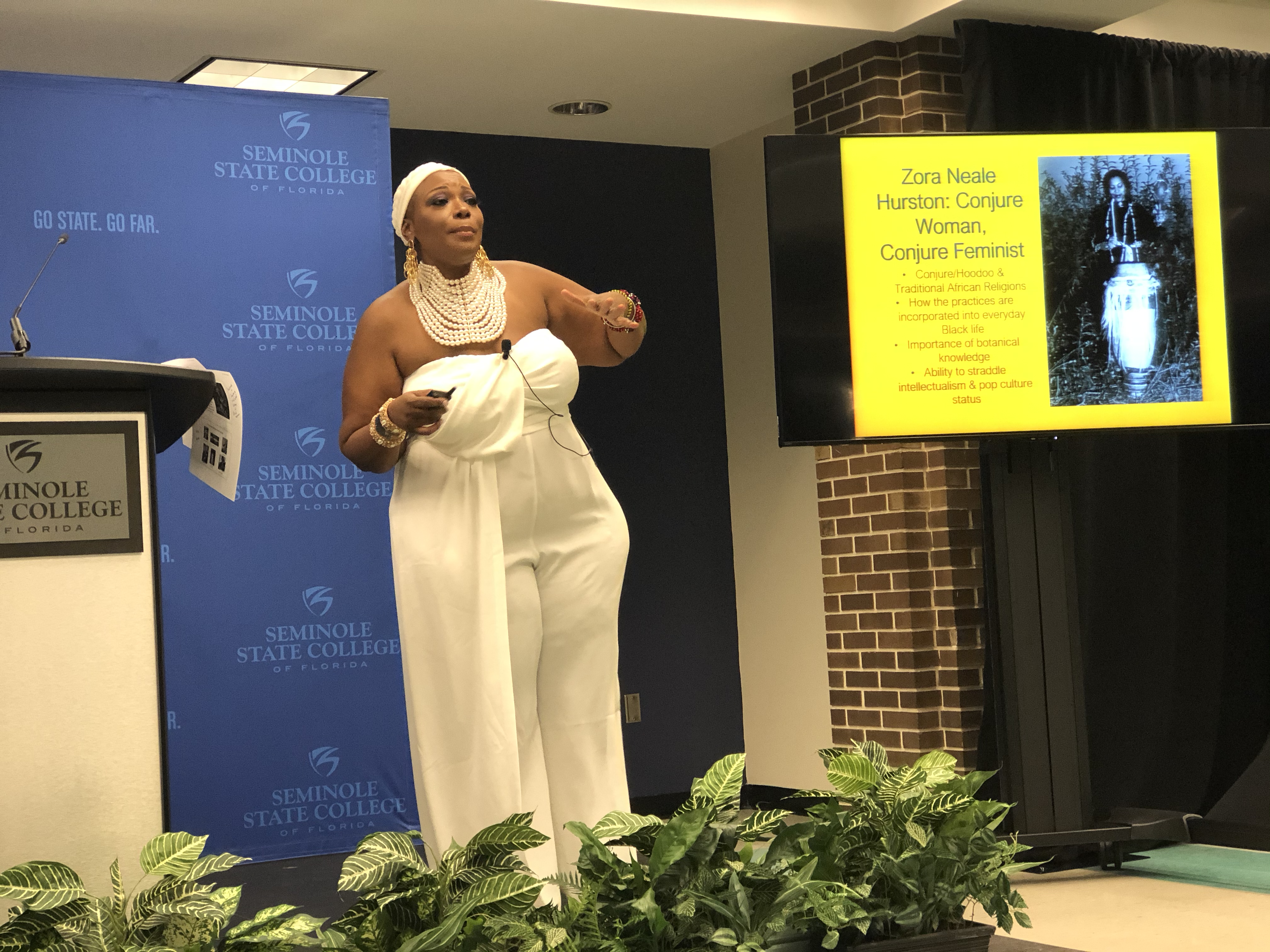2020-2021 Afrofuturism Syllabus - Week 3 - Interview with Dr. Kinitra Brooks
Image: Dr. Kinitra Brooks delivers her 2020 Afrofuturism Conference keynote address, "Is This Lemonade Organic? Placing Beyoncé in Zora Neale Hurston’s Legacy in Conjure Feminism," to a large audience at Seminole State College on Jan. 29, 2020.
Welcome to Week 3 of the ZORA! Festival 2020-2021 Afrofuturism Course!
Please begin by reviewing About the Course for an introduction and orientation to the 2020-2021 Afrofuturism Syllabus, which bridges the organizing themes of the first two years of the five-year Afrofuturism Conference Cycle: "What is Afrofuturism?" and "What is the Sound of Afrofuturism?"
Note: Each week the course coordinator will release new content related to the conference themes. Content posted here will remain publicly accessible and may be incorporated into other courses, in part or in full, via links to this site. Suggested citation: French, Scot. Syllabus for ZORA! Festival Afrofuturism Course, University of Central Florida, Orlando, Fall 2020-Spring 2021. STARS, https://stars.library.ucf.edu/afrofuturism_syllabus_about/.
Conversations
In the Conversations segment we share resources featuring participants in the 2020-2021 ZORA! Festival Afrofuturism Conference.
This week’s featured Conversation is a podcast interview with Dr. Kinitra Brooks, a leading scholar of Conjure Feminism and Afrofuturism and one of the keynote speakers at the 2020 ZORA! Festival Afrofuturism Conference.
Dr. Brooks is the Audrey and John Leslie Endowed Chair in Literary Studies in the Department of English at Michigan State University. She specializes in the study of black women, genre fiction, and popular culture. She is the author of Searching for Sycorax: Black Women’s Hauntings of Contemporary Horror (Rutgers University Press, 2017), a critical treatment of black women in science fiction, fantasy, and horror, and co-editor of The Lemonade Reader (Routledge, 2019) an interdisciplinary collection that explores the nuances of Beyoncé’s 2016 visual album, Lemonade. The essays and editorials in The Lemonade Reader present fresh, cutting-edge scholarship fueled by contemporary thoughts on film, material culture, religion, and black feminism.
The interview was conducted by Holly Baker, co-producer of the ZORA! Festival-inspired Every Tongue Got to Confess podcast series, on Jan. 29, 2020. It lasts about 30 minutes.
You can find the interview here.

EXPLORATIONS
In the Explorations segment we pose a series of questions for further investigation and class discussion, based on the featured Conversation. As you listen to the podcast interview with Dr. Brooks, consider the following questions:
Dr. Brooks was born and raised in New Orleans, "the City of the Dead." How does she relate her upbringing in NOLA to her interest in Afrofuturism and Conjure Feminism?
Dr. Brooks rejects the idea that Afrofuturism is "only about Black people in the future" and says she looks at Afrofuturism "in terms of Sankofa." The "Sankofa" is a metaphorical symbol used by the Akan people of Ghana, generally depicted as a bird with its head turned backward taking an egg from its back.
The word "Sankofa" can be translated to mean, "go back to the past and bring forward that which is useful." How does Dr. Brooks relate this African concept of circular time to her own Afrofuturist scholarship and to the Afrofuturist imagination more generally?
Dr. Brooks sees Zora Neale Hurston’s documentary work, particularly her field study of vodou/voodoo in Haiti and Jamaica, as a model for Afrofuturist scholarship and Sankofa-style recovery, arguing that "she was an Afrofuturist before there was a name for it." In what ways does Hurston, the scholar, model best practices for obtaining knowledge/insight through cultural immersion?
Dr. Brooks sees possibilities for liberation through Afrofuturist thought/imagination. How does she define liberation in terms of resistance to dominant/oppressive ideologies? Why does she distinguish between "liberation" and "freedom"? What makes liberation a source of fear/anxiety for some people?
Dr. Brooks also says Afrofuturism holds a "possibility for communication" by illuminating how people "can have worlds within worlds, conversations within conversations" -- a sort of "secret language" to be decoded. What ethical questions does this kind of “knowledge project" raise for the Afrofuturist scholar? To quote Dr. Brooks: "Are there secrets we should not tell?"
REFERENCES
Authors, artists, and works referenced in the podcast include:
Academic:
- Zora Neale Hurston, Barnard College ‘28, Tell My Horse: Voodoo and Life in Haiti and Jamaica (1938)
- Dr. Kinitra Brooks, Michigan State University, "The Conjure Woman’s Garden: Black Women’s Rootworking Traditions," Spring Colloquium of the Hutchins Center for African & African American Research at Harvard University, Feb.6, 2019
- Dr. Lindsey Stewart, University of Memphis, "Women in Philosophy: Southern Black Feminism in Philosophy," APA Blog, April 25, 2018
Cultural:
- Diana Ross
- Janet Jackson
- Akua Naru
- Princess Nokia
- Ibeyi (Naomi and Lisa-Kaindé Díaz, the twins from Beyoncé’s Lemonade)
Next week: An interview with Dr. Isiah Lavender III, Sterling Goodman Professor of English, University of Georgia.

